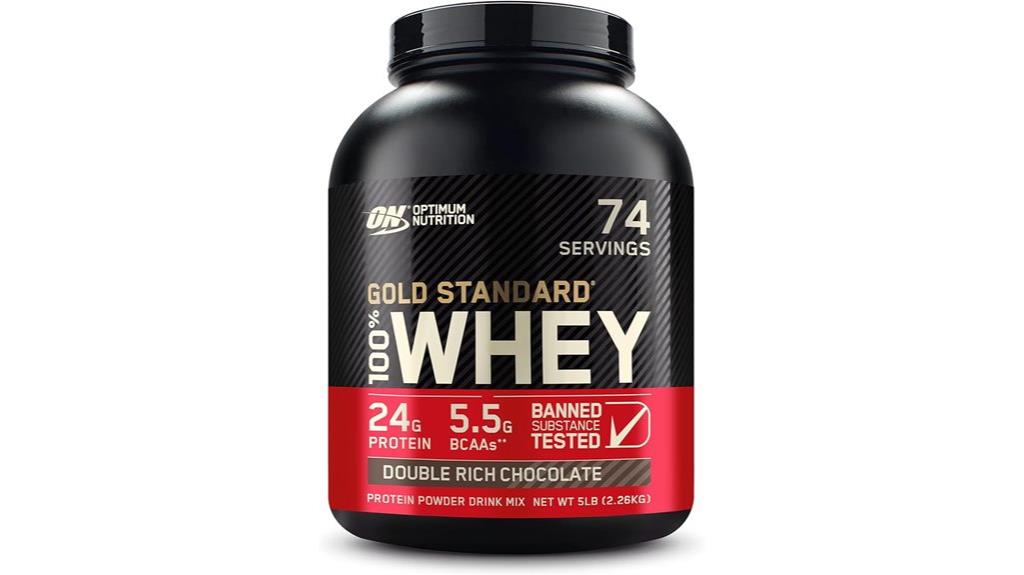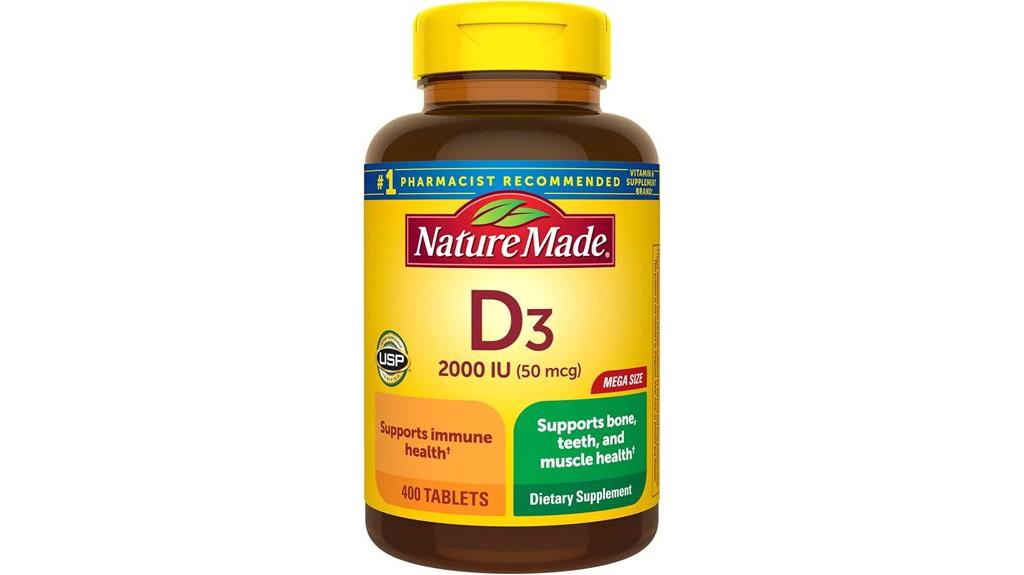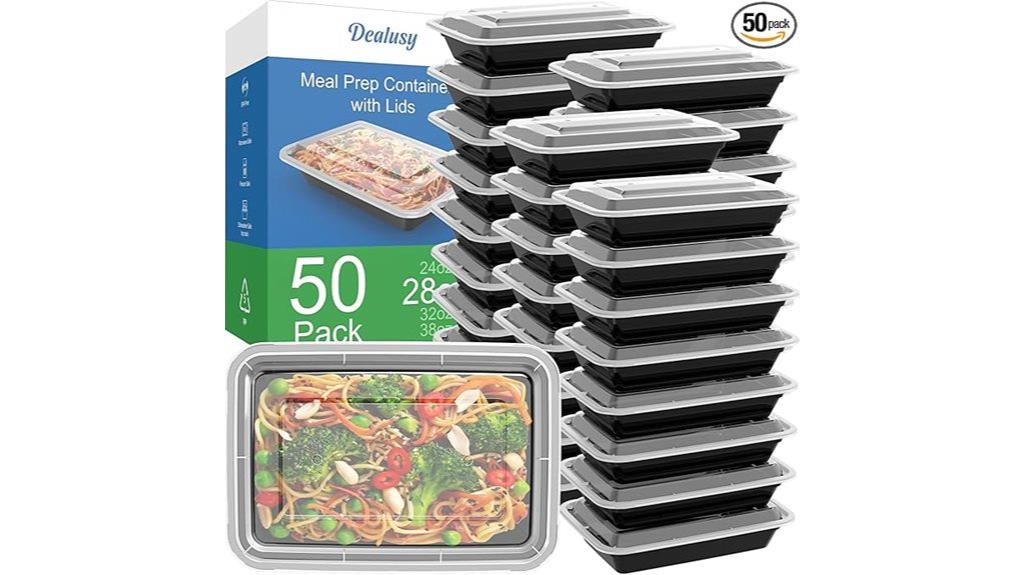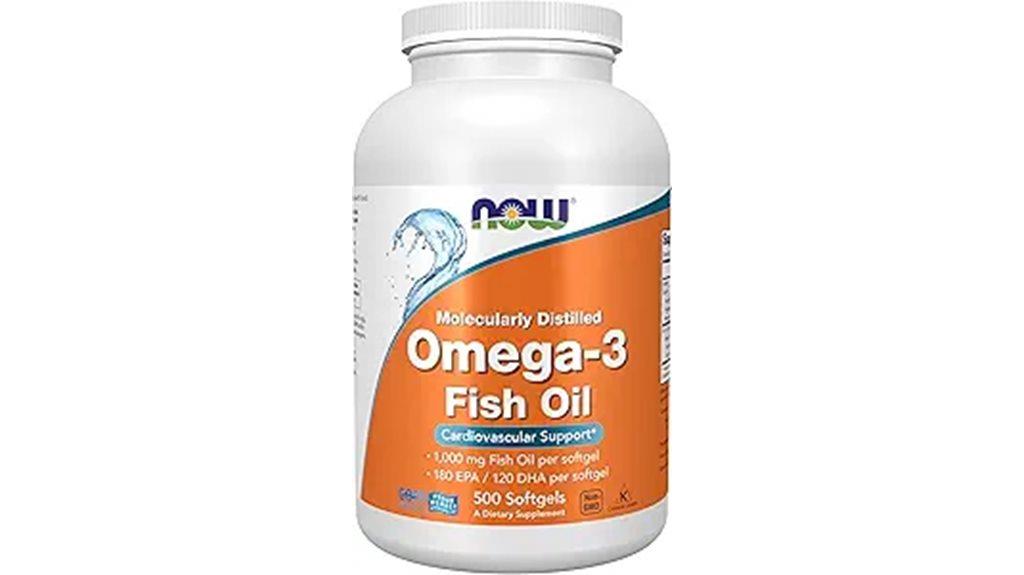Did you know that Black men often have unique nutritional needs when it comes to fitness and muscle gains? While general nutrition principles apply, factors like higher muscle mass, different body composition, and cultural dietary habits can influence ideal nutrition strategies. As you begin your fitness journey, understanding these nuances can make a significant difference in your results. From protein-rich foods that support muscle growth to micronutrients that enhance overall health, there's a wealth of information tailored specifically to your needs. Let's explore how you can fuel your body effectively and achieve your fitness goals with nutrition tips designed for Black men.
Protein-Rich Foods for Muscle Building

Protein's role in muscle building can't be overstated for Black men looking to enhance their physique. To maximize muscle gains, you'll need to incorporate a variety of protein-rich foods into your diet. Lean meats like chicken breast, turkey, and lean beef provide essential amino acids vital for muscle repair and growth.
Don't overlook plant proteins such as lentils, quinoa, and beans, which offer additional fiber and micronutrients. Dairy sources like Greek yogurt and cottage cheese are excellent for slow-release protein, ideal for overnight muscle recovery.
Supplement your intake with protein shakes, especially post-workout, to quickly deliver amino acids to your muscles. Seafood options, including salmon and tuna, provide both protein and beneficial omega-3 fatty acids.
For convenient protein snacks, consider hard-boiled eggs or egg whites, which are complete proteins containing all essential amino acids. Nut butters, such as almond or peanut butter, offer protein along with healthy fats.
Carbohydrates and Energy Balance

Balancing carbohydrate intake is vital for Black men aiming to enhance their energy levels and overall performance. Understanding different carbohydrate types and their roles as energy sources can greatly impact your fitness goals.
Complex carbohydrates, found in whole grains, legumes, and vegetables, provide sustained energy and should form the foundation of your carb intake. These slow-digesting carbs help maintain stable blood sugar levels, promoting consistent energy throughout the day.
On the other hand, simple carbohydrates from fruits and sports drinks can be beneficial for quick energy boosts before or during intense workouts. However, limit refined sugars and processed foods, as they can lead to energy crashes and hinder muscle recovery.
Timing your carb intake is essential; consume complex carbs before workouts to fuel performance and simple carbs post-exercise to replenish glycogen stores.
To maintain energy balance, adjust your carbohydrate intake based on activity level and fitness goals. If you're engaging in high-intensity training, increase your carb consumption to support energy demands.
Conversely, if you're focusing on fat loss, moderate your carb intake while ensuring adequate protein and healthy fats to preserve muscle mass and maintain ideal energy levels.
Healthy Fats for Hormone Regulation
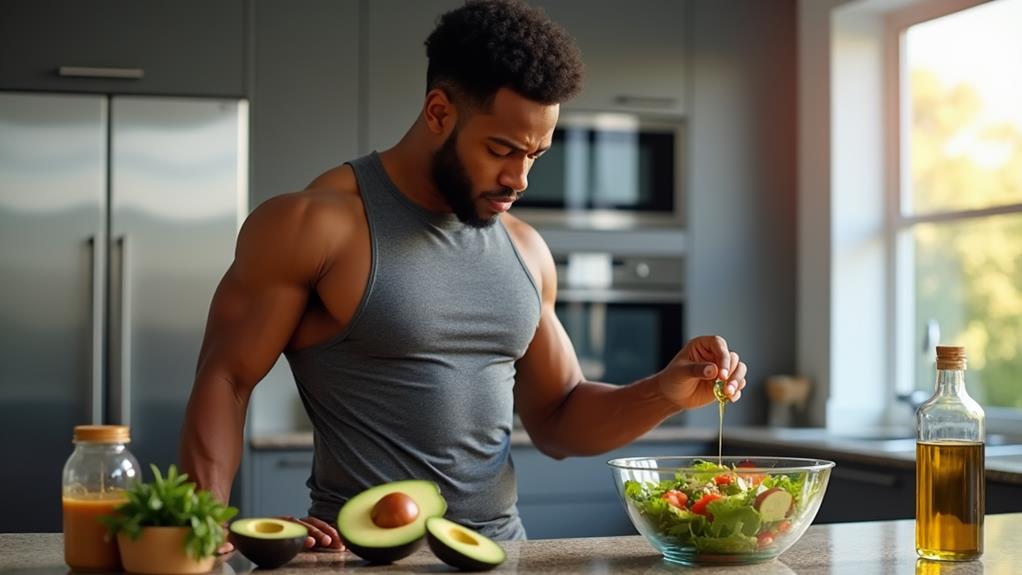
While often overlooked, healthy fats play an essential role in hormone regulation for Black men. Your fat intake directly impacts testosterone levels, an important hormone for muscle growth and overall health. To enhance hormone health, focus on incorporating omega-3 sources like fatty fish, flaxseeds, and walnuts into your diet. These fats can help reduce inflammation and support brain function.
Don't shy away from dietary fats; they're essential for nutrient absorption, especially fat-soluble vitamins. Include avocados in your meals for their benefits, including heart-healthy monounsaturated fats and potassium.
When preparing meals, consider cooking methods that preserve healthy fats, such as baking, grilling, or using an air fryer. To maintain hormone balance, aim for meal variety and include healthy snacks like nuts and seeds throughout the day. These act as natural testosterone boosters and provide sustained energy.
Hydration and Performance

Proper hydration is a cornerstone of ideal athletic performance for Black men. Your body's water needs increase during physical activity, and dehydration can quickly lead to decreased performance, fatigue, and increased risk of injury.
To optimize your hydration strategies, aim to consume 16-20 ounces of water 2-3 hours before exercise, and another 8-10 ounces 20-30 minutes prior to your workout.
During exercise, you'll want to drink 7-10 ounces every 10-20 minutes to maintain hydration levels. For sessions lasting longer than an hour or in hot conditions, incorporate electrolyte-rich sports drinks to replenish lost minerals.
Post-workout, focus on rehydrating by consuming 16-24 ounces of fluid for every pound of body weight lost during exercise.
For performance optimization, monitor your urine color; pale yellow indicates proper hydration. Dark urine suggests you need to increase fluid intake.
Additionally, weighing yourself before and after workouts can help you gauge fluid loss and adjust your hydration strategy accordingly.
Micronutrients for Optimal Health
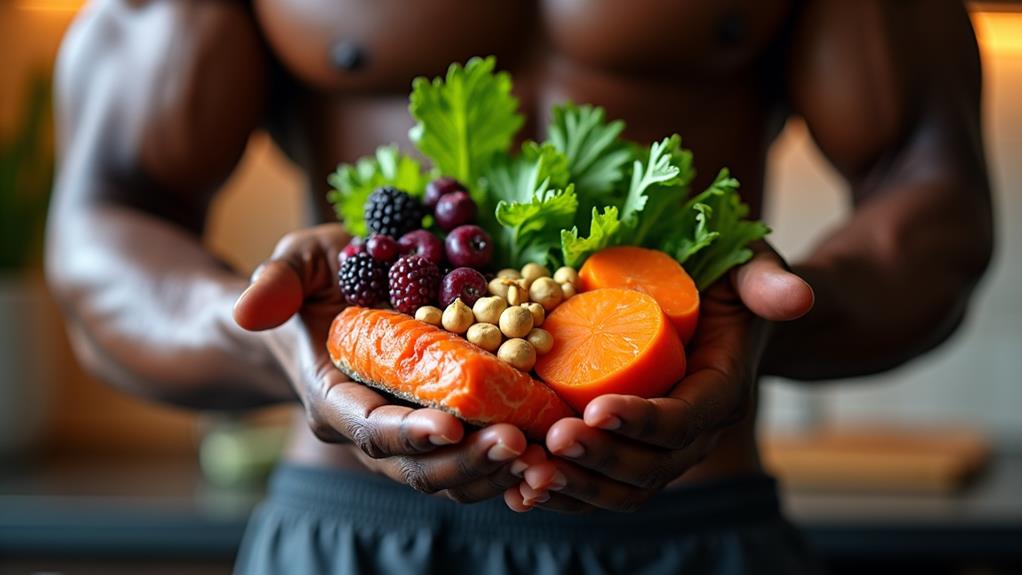
Although often overlooked, micronutrients play an essential role in optimizing health and athletic performance for Black men. These essential vitamins and minerals support various bodily functions, including muscle growth, recovery, and energy production. To maximize your fitness gains, you'll need to pay attention to your micronutrient intake.
Focus on diverse vitamin sources to cover your bases. Dark leafy greens, citrus fruits, and fortified whole grains provide important vitamins like A, C, and B-complex. For Black men, vitamin D is particularly important due to reduced synthesis from sunlight exposure. Consider fatty fish, egg yolks, and fortified dairy products to boost your vitamin D levels.
Mineral absorption can be enhanced by pairing iron-rich foods with vitamin C sources. Combine lean meats or legumes with bell peppers or citrus fruits to improve iron uptake.
Zinc, found in oysters, beef, and pumpkin seeds, supports testosterone production and immune function. Magnesium, abundant in nuts, seeds, and whole grains, aids in muscle recovery and sleep quality. Calcium, vital for bone health, can be obtained from dairy products, fortified plant-based milk, and dark leafy greens.
Meal Timing and Frequency

In today's fast-paced world, understanding meal timing and frequency is essential for Black men aiming to enhance their nutrition. Research suggests that strategically planning when and how often you eat can greatly impact your fitness goals and overall health.
Intermittent fasting has gained popularity as an effective approach to meal timing. This method involves alternating periods of eating and fasting, which can help improve insulin sensitivity, promote fat loss, and potentially increase longevity. Common intermittent fasting protocols include the 16/8 method, where you fast for 16 hours and eat within an 8-hour window.
However, traditional meal timing strategies can also be effective. Consuming protein-rich meals every 3-4 hours throughout the day can help maintain muscle mass and support recovery. For ideal muscle gains, aim to consume protein within 30 minutes post-workout to maximize the anabolic window.
Ultimately, the best meal timing and frequency strategy depends on your individual goals, lifestyle, and preferences. Experiment with different approaches to find what works best for you, and consider consulting a registered dietitian for personalized advice tailored to your specific needs as a Black man focused on fitness and muscle gains.
Portion Control Strategies
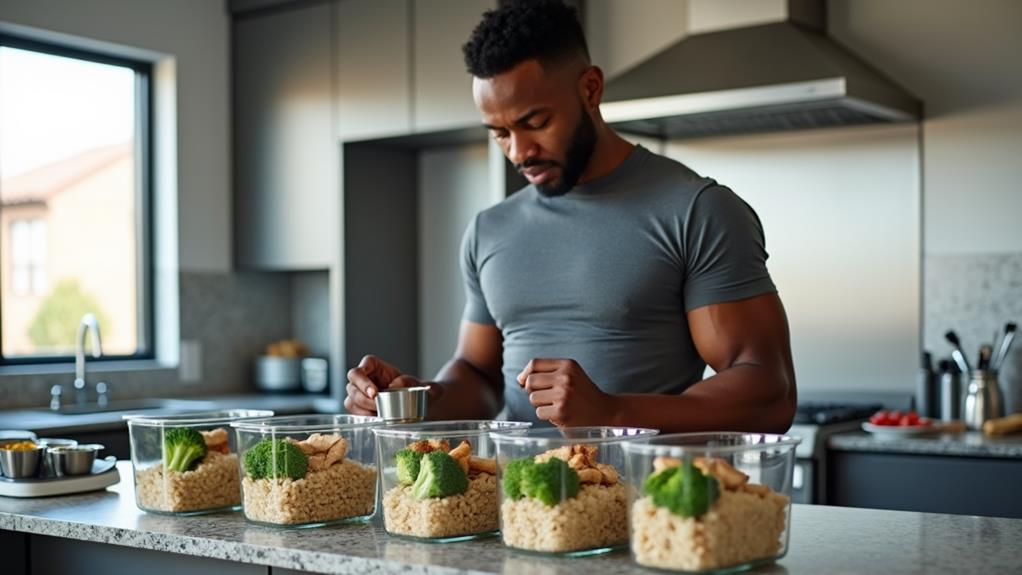
How can Black men effectively manage their portion sizes to support their fitness goals? Implementing portion control strategies is essential for optimizing nutrient intake and maintaining a balanced diet.
Start by using smaller plates and bowls to create the illusion of fuller portions. This visual trick can help you feel satisfied with less food.
Practice mindful eating by paying attention to hunger and fullness cues. Chew slowly and savor each bite, allowing your body time to register satiety.
Use the hand method for estimating portion sizes: a palm-sized portion for protein, a fist-sized portion for vegetables, a cupped hand for carbohydrates, and a thumb-sized portion for fats.
Measure and weigh food initially to calibrate your perception of appropriate portion sizes. Pre-portion snacks and meals to avoid overeating, especially when consuming calorie-dense foods.
When dining out, consider splitting entrees or asking for a to-go container at the start of the meal to set aside half for later.
Stay hydrated by drinking water before and during meals, which can help control appetite and prevent overeating.
Consistently applying these strategies will support your fitness goals and muscle-building efforts.
Pre-Workout Nutrition
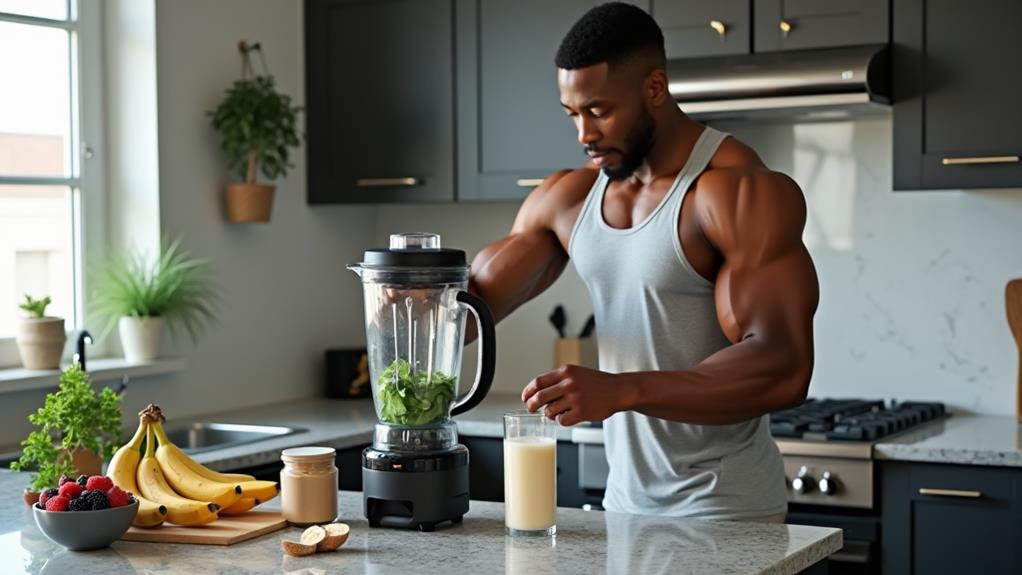
Fuel is essential for ideal performance during workouts. To maximize your gains and energy levels, focus on pre-workout nutrition. Nutrient timing plays a significant role in enhancing your body's response to exercise.
Consume a balanced meal containing carbohydrates and protein 2-3 hours before your workout. This allows for proper digestion and nutrient absorption.
If you're short on time, opt for easily digestible pre-workout snacks 30-60 minutes before exercise. Choose foods that provide quick energy without causing digestive discomfort.
Bananas, Greek yogurt with berries, or whole-grain toast with almond butter are excellent options. These snacks offer a mix of fast-acting carbohydrates and protein to fuel your muscles and maintain blood sugar levels.
Hydration is equally important. Drink 16-20 ounces of water 2-3 hours before your workout, and another 8 ounces 20-30 minutes prior.
For intense or prolonged sessions, consider adding electrolytes to your pre-workout fluid intake. This strategy helps prevent dehydration and maintains ideal performance during your training session.
Post-Workout Recovery Fuel
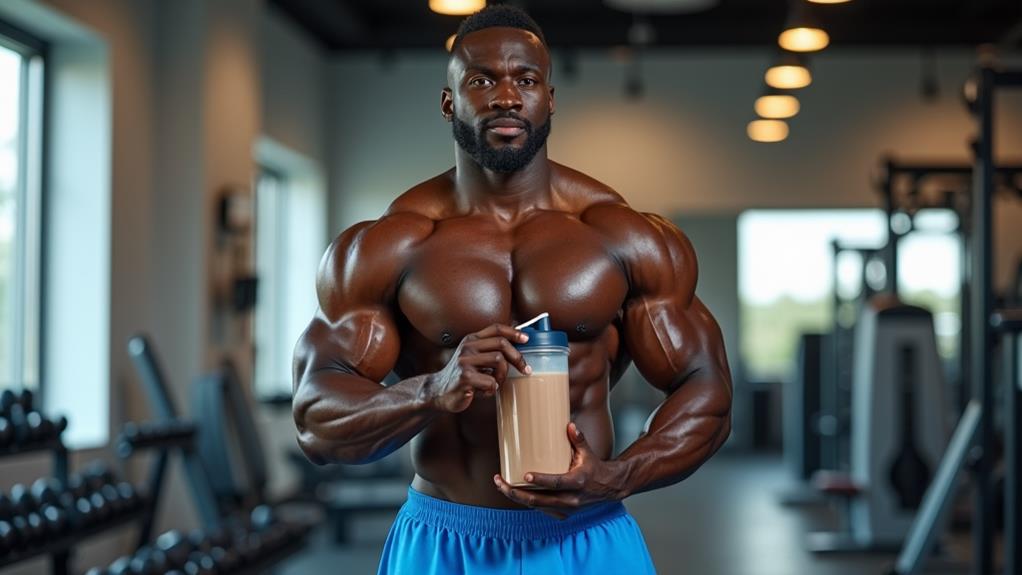
After pushing your body during a workout, proper post-exercise nutrition becomes your next priority. Your recovery fuel should focus on protein timing and muscle repair, while also addressing glycogen replenishment and inflammation reduction. Aim to consume a balanced mix of protein and carbohydrates within 30 minutes of finishing your session to optimize nutrient absorption and kickstart the recovery process.
Post-workout smoothies are an excellent option, combining easily digestible proteins like whey or plant-based alternatives with fast-acting carbohydrates from fruits or honey. For solid recovery snacks, consider lean meats paired with complex carbohydrates like sweet potatoes or whole grains. These combinations support muscle protein synthesis and restore energy levels.
Don't overlook the importance of hydration and electrolyte balance in your post-workout routine. Include foods rich in potassium, magnesium, and sodium to replenish lost minerals and maintain proper muscle function.
Additionally, incorporating anti-inflammatory foods like tart cherries or turmeric can aid in reducing exercise-induced inflammation.
To support digestive health and overall wellness, include probiotic-rich foods or supplements in your post-workout nutrition plan. This helps maintain gut health and enhances nutrient absorption, contributing to your long-term fitness goals and overall well-being.
Supplements for Black Men
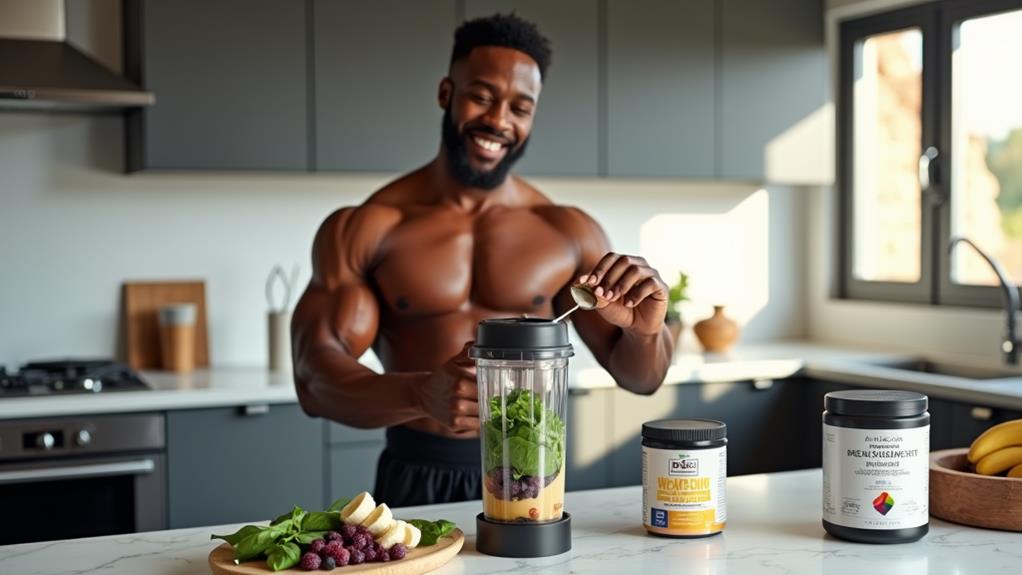
Supplement selection for Black men requires careful consideration of specific nutritional needs and health concerns. Your genetic predisposition to certain deficiencies and health risks necessitates a tailored approach to supplementation.
Vitamin D is vital, as darker skin reduces natural production from sunlight exposure. Aim for 2000-4000 IU daily to support bone health, immune function, and muscle strength.
Consider creatine monohydrate for enhanced muscle power and recovery. It's particularly effective for individuals with naturally lower creatine levels, which is common among Black men.
Fish oil supplements can help combat the higher risk of cardiovascular disease by reducing inflammation and improving lipid profiles.
When exploring herbal supplements, be cautious and consult a healthcare professional. Some, like saw palmetto for prostate health, may be beneficial, but efficacy can vary.
Prioritize supplements that address specific health concerns prevalent in Black men, such as hypertension and diabetes. Magnesium and chromium supplements may help regulate blood pressure and glucose levels, respectively.
Always choose high-quality, third-party tested supplements to guarantee purity and potency.
Cultural Foods and Nutritional Value

Across the African diaspora, traditional foods offer a rich tapestry of flavors and nutritional benefits. These cultural staples can be leveraged to support your fitness goals and muscle-building efforts. Many traditional recipes are packed with nutrient-dense ingredients that provide essential vitamins, minerals, and macronutrients.
For instance, okra, a common vegetable in African and Southern cuisine, is high in fiber, antioxidants, and vitamin C. It can aid in digestion and support immune function. Collard greens, another cultural staple, are rich in vitamins A, C, and K, as well as calcium for bone health. Incorporating lean proteins like grilled fish or jerk chicken can provide the amino acids necessary for muscle repair and growth.
The cultural significance of these foods extends beyond nutrition. They connect you to your heritage while fueling your body. By adapting traditional recipes to fit your fitness goals, you can maintain a balanced diet that honors your roots.
Consider portion control and preparation methods to optimize nutritional value. For example, baking instead of frying, or using healthier oils like olive or avocado oil, can enhance the nutritional profile of cultural dishes while preserving their authentic flavors.
Meal Prep and Planning

Building on the foundation of nutritious cultural foods, effective meal prep and planning can greatly enhance your fitness journey. Implementing efficient meal prep techniques will save you time, reduce stress, and guarantee you're consistently consuming nutrient-dense meals to support your muscle gains and overall health.
Start by developing a weekly meal plan that incorporates a balance of proteins, complex carbohydrates, and healthy fats. Focus on lean meats, fish, legumes, whole grains, and vegetables. Once you've outlined your meals, create a detailed grocery shopping list to streamline your supermarket visits. Purchase in bulk when possible to save money and reduce frequent trips.
Dedicate a specific day each week for meal preparation. Cook large batches of proteins and grains, and pre-cut vegetables for easy assembly throughout the week. Invest in quality food storage containers to keep your prepped meals fresh.
Consider using slow cookers or pressure cookers to maximize efficiency. Portion out your meals into individual containers, making it easy to grab and go. This strategy helps control portion sizes and prevents impulsive food choices.
Conclusion
You've now got a solid foundation for fueling your fitness journey. By incorporating these nutrition tips, you'll be well on your way to sculpting the physique you desire. Remember, consistency is key—stick to your plan like a lion to its prey. Tailor your diet to your specific needs, leveraging cultural foods and smart supplementation. With proper nutrition, hydration, and recovery strategies, you're primed to maximize your muscle gains and overall health. Keep pushing forward!
Join The Discussion
What are your go-to nutrition strategies for fitness and muscle gains? Share your favorite supplements, meal prep tips, and cultural recipes with the community. Let’s empower each other to achieve our health and fitness goals together!
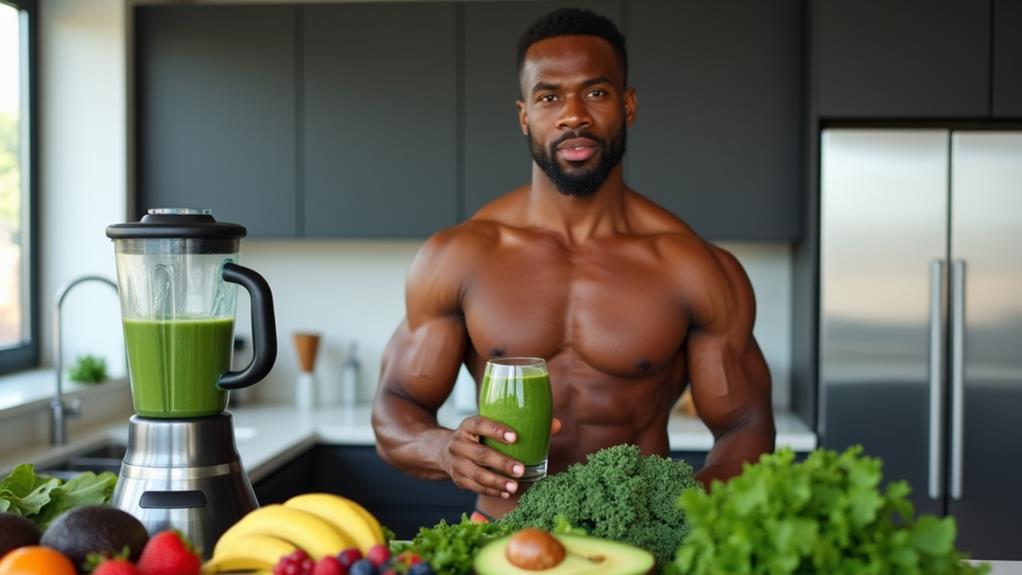
Fuel your fitness journey with these essential products that optimize muscle growth, recovery, and overall health, tailored to meet your unique needs as a Black man striving for peak performance.



